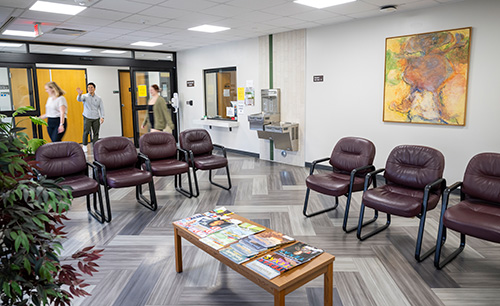
DENTON (UNT), Texas — Since 1972, the Psychology Clinic in the University of North Texas’ Department of Psychology has provided accessible mental health services to individuals across the Dallas-Fort
Worth area. The clinic is a community-facing facility with three overarching goals:
provide training to doctoral psychology students, further knowledge in the field through
research and provide evidence-based care to the community.
“We leave no stone unturned when it comes to understanding the clients we evaluate
and treat,” said Jennifer Schwartz, clinic director and board-certified psychologist.
The clinic, which is staffed by doctoral student clinicians under supervision by licensed
psychologists, serves a diverse client population with presenting concerns such as
depression, anxiety and personal growth issues. Clients work directly with student
clinicians on treatment plans, empowering clients to track their progress and gain
confidence in their skills when treatment comes to an end.
The clinic serves about 300 clients each year. The clinic is just one of numerous
public-facing clinics and resource centers that are designed to give UNT students
hands-on practical experience in their fields while also serving Dallas-Fort Worth
area community members. UNT operates dozens of centers and clinics open to the public
for services, such as the UNT Speech and Hearing Center, the Child and Family Resource Clinic and the Kristin Farmer Autism Center.
A client’s first visit — an intake session — is free of charge. The clinic offers
counseling services, assessments and diagnostic work-ups on a sliding-scale basis.
“Very often, the clients that we serve — due to a lot of factors beyond their control
— would not otherwise have access to the kind of care we can provide them,” Schwartz
said.
Doctoral students in the psychology department can pursue degrees in clinical psychology
or counseling psychology. Student clinicians may begin working with clients after
completing one year of doctoral coursework. Each student clinician cycles through
different roles in the clinic, from counseling and assessments to administrative work,
to prepare for every aspect of their future careers.
Charlie Su, a Ph.D. candidate in UNT’s clinical psychology program, knew from a young age that he wanted to be a psychologist. His research focuses
on family processes and their connection to mental health issues. One of Su’s research
projects studies how existing psychological screening tools might be changed or improved
to benefit populations from differing racial and ethnic backgrounds.
“If you have an assessment tool that works differently across people from different
cultural backgrounds, that has implications on treatment planning. That may lead to
large disparities in treatment outcomes — like whether someone will receive ODA accommodations,
be prescribed psychotropic medications, and even whether someone would be hospitalized
involuntarily,” Su says. “So, I’m really glad I’m doing this research.”

Lauren Kemble, a Ph.D. candidate in UNT’s counseling psychology program, also knew she wanted to pursue psychology early on. She says it was her lifelong
fascination with patterns in human interaction that inspired her career path.
“Counseling psychology basically empowers people to reach their greatest potential,”
Kemble said. “I believe everyone has that ability.”
Kemble’s research led her to create a trauma exposure checklist, a tool clients can
use to self-report traumatic events they’ve experienced. Many existing checklists
only contain common traumatic events — known as “Capital T” traumas — such as car
accidents and natural disasters. Kemble’s checklist includes events such as medical
trauma and spiritual abuse and is intended to validate clients’ lived experiences.
Many student clinicians who work in the Psychology Clinic become practicing psychologists
in the Dallas-Fort Worth area. Kemble, who is working towards a career in child and
family counseling, looks forward to using her knowledge to improve the lives of others.
“Doing counseling therapy means walking alongside people as they let us into their
lives,” Kemble said. “In my opinion, that’s such a great honor.”
To schedule an appointment at the UNT Psychology Clinic, call the clinic office at
(940) 565-2631, or stop by the clinic at 1611 W Mulberry St # 171, Denton, TX 76201.